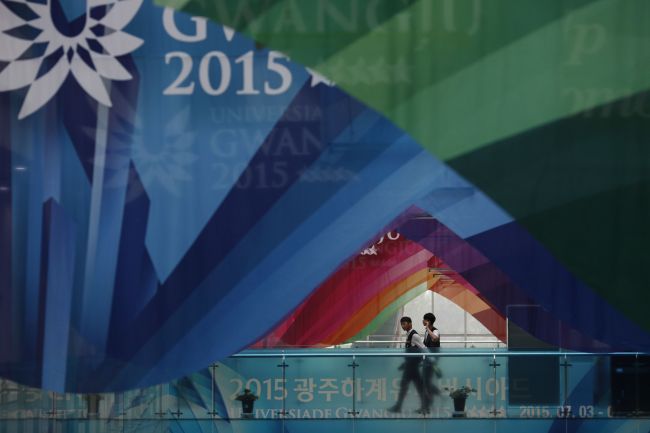[Weekender] Universiade pursues eco, peace, IT, culture
By Park Hyung-kiPublished : July 3, 2015 - 21:46
Universiade Gwangju 2015 pursues four visions: eco, peace, information technology and culture. Organizers have named the 2015 Universiade Ecoversiade, Peaceversiade, ITversiade and Cultureversiade, summing them up with the acronym EPIC.
Guided by the vision of Ecoversiade, Gwangju has tried to preserve the environment by using as many existing sports facilities as possible. The host city has refurbished 97 percent of the 73 competition venues, while constructing a swimming pool and a few other facilities. The city has reconstructed 30-year-old apartment buildings for the Athletes Village. It is the first time for a city in Korea to push a reconstruction project to host a sporting event. A “Clean Road System” has also been introduced by planting 2,015 trees along the roads and enlarging downtown parks.
Peaceversiade describes how committed Gwangju is to democracy, human rights and peace. Students rallied in Gwangju for the national independence from Japanese colonial rule in November 1929. They also stood up against a nationwide martial law imposed by the military strongman Chun Doo-hwan in May 1980. More recently, the city hosted a summit of Nobel peace laureates in 2006.
Gwangju has pursued ITversiade by taking advantage of Korea’s advanced IT infrastructure to run the Universiade efficiently. Information technology is so essential in modern sports meets. The host city has developed the Total Integration Management System to link all online and mobile information systems related to the event. On top of the IT support, the recently constructed convention center in Gwangju will provide superb business services.
Guided by the vision of Ecoversiade, Gwangju has tried to preserve the environment by using as many existing sports facilities as possible. The host city has refurbished 97 percent of the 73 competition venues, while constructing a swimming pool and a few other facilities. The city has reconstructed 30-year-old apartment buildings for the Athletes Village. It is the first time for a city in Korea to push a reconstruction project to host a sporting event. A “Clean Road System” has also been introduced by planting 2,015 trees along the roads and enlarging downtown parks.
Peaceversiade describes how committed Gwangju is to democracy, human rights and peace. Students rallied in Gwangju for the national independence from Japanese colonial rule in November 1929. They also stood up against a nationwide martial law imposed by the military strongman Chun Doo-hwan in May 1980. More recently, the city hosted a summit of Nobel peace laureates in 2006.
Gwangju has pursued ITversiade by taking advantage of Korea’s advanced IT infrastructure to run the Universiade efficiently. Information technology is so essential in modern sports meets. The host city has developed the Total Integration Management System to link all online and mobile information systems related to the event. On top of the IT support, the recently constructed convention center in Gwangju will provide superb business services.

Cultureversiade comes natural and easy, as Gwangju has established itself as a city of arts and culture. A number of distinguished artists were born in Gwangju. Among them were top pansori singer Im Bang-wool, Korean painter of the Chinese Southern School Heo Baek-ryon and composer of Chinese modern songs Jeong Yul-seong.
The city hosts Korea’s two big-name art exhibitions, Gwangju Biennale and Gwangju Design Biennale. Launched in 1995, Gwangju Biennale is considered on par with the Venice and Whitney biennales.
That aside, the World Kimchi Culture Festival, Jeong Yul-seong International Music Festival and International Youth Music Festival have elevated Gwangju to the center of Asian culture. The Asian Culture Complex is set to open its doors officially in September, this year.
Universiade Gwangju 2015 will offer participants a cornucopia of cultural events at the complex and other places. They will be able to enjoy cultural programs on the streets as well as at the Athletes Village.
Gwangju has many must-see attractions. Among them are the Eujae Museum of Korean Art and Yangnim-dong Alley. Eujae is painter Heo’s penname. In the alley, visitors can appreciate well-preserved Western architecture from the early 20th century.
To share the four visions with more university students, the 2015 Gwangju Universiade Organizing Committee teamed up with the U.N. Office on Sport for Development and Peace. The two organizations held a joint EPIC forum each year from 2013 to 2015.
The forum served as an international mentoring program for young people. It dealt with three themes: “Sports for development” in 2013, “Sport meets Art & Culture” in 2014 and “Sport Lights up Tomorrow” in 2015. At the three forums, a total of 13 speakers took to the podium and gave over 1,000 young people inspiring lectures. They talked about how they overcame challenges and succeeded.
The 13 speakers included Achim Steiner, executive director of the U.N. Environment Program; Tegla Loroupe, U.N. sport ambassador; Lee lee nam, a media artist; Stefan Bergh, FISU vice president; Ma Young-sam, Korea’s ambassador for public diplomacy; Laima Janusonyte, vice president of the International Sports Press Association (AIPS); Jang Mi-ran, retired Korean female weightlifter who won gold medal in the 2008 Olympics; Kim Won-soo, special adviser to the U.N. secretary-general; Evelyn Wata, secretary-general of AIPS; Park Seung-hi, Korean Olympic gold medalist in women’s short track speed skating; Lee Kyu-hyuk, Korean long-track speed skater; Park Hwa-yeong, chief executive of Incoco Korea; and Kim Se-jin, gold medalist at the IPC Swimming World Championships for the disabled.
By Chun Sung-woo (swchun@heraldcorp.com)



















